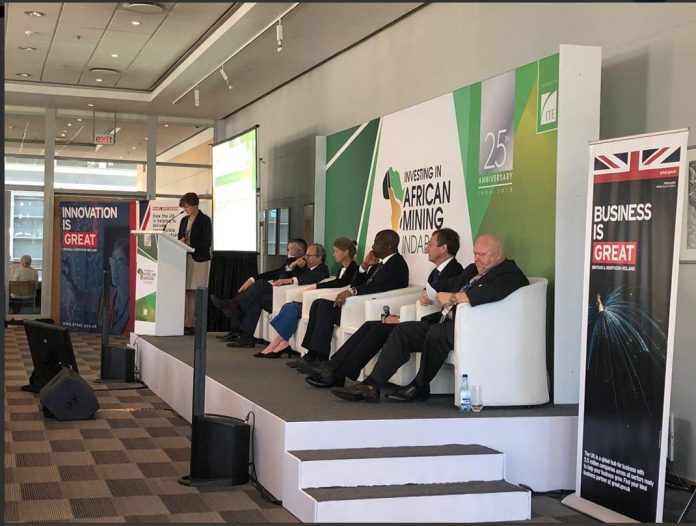By Jeph Ajobaju, Chief Copy Editor
The United Kingdom, which has 150 years of mining heritage, is poised to use its corporate governance expertise to help Africa’s mining sector propel the continent’s economic growth up to year 2170.
That may cheer the continent’s largest oil producers – Nigeria, Angola, and Libya – but it may also undermine economic diversification and deepen their reliance on dwindling fossil fuel while the rest of the world grows on knowledge economy powered by alternatives in clean energy.
Africa produces 92 per cent of the world’s platinum/palladium, with South Africa as the leading producer at 97 per cent. South Africa also produces 99 per cent of the coal on the continent but that accounts for only 5 per cent of the global output.
Other solid minerals African countries depend on include
- Diamonds – Botswana, Democratic Republic of Congo, South Africa, and Angola
- Gold – South Africa, Ghana, Tanzania, and Mali.
- Uranium – Namibia, Niger Republic, and South Africa.
- Bauxite (for aluminium) – Guinea and Ghana.
- Steel – South Africa, Egypt, Libya, and Algeria.
- Aluminium – South Africa, Mozambique, and Egypt.
- Copper – Zambia, South Africa, Democratic Republic of Congo, and Egypt.
The UK’s Department for International Trade (DIT) hosted a panel discussion at the biggest mining conference on the continent, tagged Mining Indaba, held in Cape Town, South Africa, where visitors dialogued with key figures in mining, agriculture, finance, and government.
The discussion included how British corporate governance experts can help manage stakeholder relations and provide effective communication of what a mine will deliver at the local, regional, and national level.
The panellists also spoke on how the UK is using over 150 years of mining heritage to secure sustainable economic development in Africa for the next 150 years and beyond.
They reiterated the importance of forging a holistic, responsible approach to mining; delivering mutual stakeholder value with focus on sustainable mining ecosystems which serve both business and communities.
The discussion was illustrated by a project in Guinea highlighting how this type of approach could foster wider, sustainable infrastructure development.
The panel was facilitated by the Director of Fauna & Flora International’s Extractives & Development Infrastructure Programme, Pippa Howard.
It comprised Guinean Mines and Geology Minister, Abdoulaye Magassouba; British Ambassador to Guinea, Catherine Inglehearn; Anglo African Minerals CEO, James Lumley; LeaderstarSolutions CEO, Hal Hemmerich; HCF International co-founder and President, Guy De Selliers; and Impact Agri CEO, Jon White.
British Deputy Trade Commissioner for Africa, Martin Kent, said the panel reinforced the UK’s leading position as Africa’s responsible mining partner of choice.
In his view, it was “an incredibly rich discussion illustrating the breadth of British expertise and our commitment to delivering partnerships and genuine collaboration.”
Pippa Howard of Flora and Fauna International, added that it was encouraging to facilitate a conversation with socio-economic issues central in helping avoid conflict with land users, but also central in evolving sustainable agricultural development.
“The pragmatism and realism of the panel was refreshing, it’s vital projects are commercially viable. Projects that don’t work economically don’t work socially,” she stressed.
The discussion was attended by about 200 guests, including Sierra Leonean Mineral Resources Minister, Morie Manyeh; and British High Commissioner to South Africa, Nigel Casey; as well as a wide array of private sector businesses in the mining supply chain.
The UK has a 150-year mining heritage and a strong supply chain supporting the mining lifecycle and is known globally as a leading source of mining finance, with London the prime location for raising capital.
The UK is also home to a large number of professional service providers delivering a wide variety of expertise to mine owners, governments, and investors.
Global institutions supporting the development and implementation of international standards are also based in the UK.
British companies have world-class capability in assessing the social and environmental impacts of mining through stakeholder analysis.
This work informs strategies that create long-term economic prosperity while protecting biodiversity, ecosystems and the environment.
Along with a strong policy and governance framework, clear human rights policies are an essential requirement of investors and capital markets throughout the mining lifecycle.
Kate Rudd, Director Energy and Mining for DIT Africa, canvassed that “responsible mining is the only option for long term success and the mitigation of long term risks.
“Whilst there may be a time and cost implication at the outset, the return on investment is unquestionable.
“I believe the UK is best placed to drive this conversation and convene responsible actors who reflect our values, making the UK the responsible partner of choice in Africa.”
DIT offers expertise and contacts through its extensive network of specialists in the UK, and in British diplomatic missions around the world.
It provides companies with the tools they require to be competitive on the world stage.














